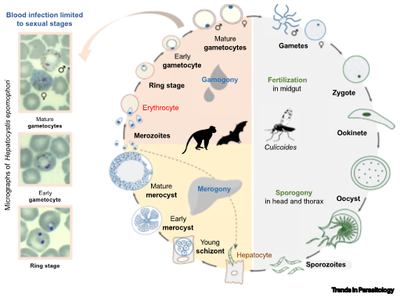Diversity of malaria (haemosporidian) parasites in bats
Dr. Juliane Schaer
Email: schaerju@hu-berlin.de
Website: juliane-schaer.org
Bats play an important role in the evolutionary history of malaria (haemosporidian) parasites. They feature the highest diversity of haemosporidian parasites among mammals and harbor several parasites that are closely related to mammalian Plasmodium species. Despite the close relationship to Plasmodium species, these wildlife parasites feature differences e.g. in life cycle and host preferences (Fig.).

Studying these parasites will contribute to answer important questions, e.g. whether the invasion of mammals occurred more than once in the evolution of haemosporidian parasites or why the human-infecting species Plasmodium falciparum is more virulent than other Plasmodium species.
Our projects include amongst others the investigation of the diversity, prevalence and evolutionary relationships of haemosporidian parasites of African, Asian, European and Australian bats.
All publications:
https://juliane-schaer.org/publications/
